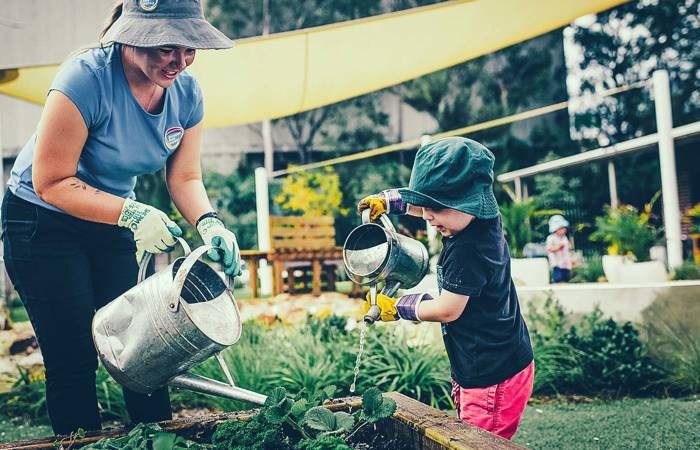Like what you see?
Sign up to receive more free parenting advice.
Thank you for subscribing to our newsletter!
Early Learning

Credit: iStock.com/kali9
The short and long-term benefits of preschool for children are well-known, however, new research shows those benefits are amplified by the quality and quantity of the preschool experience.
“We know from research right around the world that those benefits from preschool are really strong and some of them last right through children’s entire lives,” says Kate Noble, Policy Fellow at the Mitchell Institute for Education and Health Policy at Victoria University.
“Preschool really sets kids up for learning once they get to school.”
Preschool is early childhood education in the years before a child starts primary school, and in Australia it goes by different names: preschool, kindergarten and pre-prep, and it is delivered in different settings, by different types of providers.
Preschool can be offered at long day care centres, standalone preschools, and schools, and these can be run by schools, local councils, private providers and community organisations.
In Australia, preschool programs are guided by the Australian Early Years Learning Framework and, according to Kate, is “defined as a structured, play-based educational program specifically designed for three and four-year-old children”.
“A large body of research has documented the benefits of high quality preschool programming,” says Dana McCoy, Assistant Professor at Harvard Graduate School of Education.
“We know from decades of studies that children who are enrolled in quality early educational services demonstrate immediate gains in their academic and non-academic skills, and these benefits can even persist all the way into adulthood.
“In addition to having individual consequences for young children and families, high-quality preschool can also generate economic and social benefits, saving communities money in the long run.”
Two or more years of quality preschool improves children’s literacy and numeracy attainment when they start school, compared with children attending no preschool, or one year.Kate Noble
The UK’s first major study to focus on the effectiveness of early years education found that children with preschool experience gained higher English and maths results in their final years and they were better at self-regulation, social behaviour and less inclined to hyperactivity.
The study’s findings led to the free provision of high-quality preschool for all three and four-year-olds in the UK, and to free high-quality preschool for the poorest 40 per cent of two-year-olds.
In Australia, using the Australian Early Development Census (AEDC) data research shows that children who attend preschool are less likely to be developmentally vulnerable across all five developmental domains upon starting school and those who stand to benefit the most are disadvantaged children.
“Research has also shown that low-income children often benefit the most from early educational services, and that preschool can help to close the gap between them and their more advantaged peers at school entry,” says Dana.
“In this sense, high quality preschool may serve as an important ‘equaliser’, supporting all children to get the best possible start in life.”
Kate points out that, “there are two factors that amplify the benefits of preschool: one is time, or quantity of years spent in preschool and the second is quality, of the educators, their relationships with children, and the program”.
The number of years at preschool matters
In a 2016 report, the Mitchell Institute says, “access to a high-quality preschool program is one of the few proven strategies for lifting outcomes for all children”.
“Evidence shows that two years of preschool has more impact than one, especially for the children most likely to be developmentally vulnerable.”
The report states that almost a quarter of Australian children entering school do not have the foundational skills they need.
It advocates that two years of universal access to preschool, starting at three years old, could dramatically improve Australian children’s social and education skills.
“Two or more years of quality preschool improves children’s literacy and numeracy attainment when they start school, compared with children attending no preschool, or one year,” Kate Noble says.
“Research also shows that children who’ve participated in preschool are more independent and better able to concentrate and cooperate.
These skills are also really fundamental to doing well in school, and in life.
“Many of these benefits last throughout high school, with preschooled students achieving higher grades than their peers, and they can extend right through to adulthood, for example through increased earnings over a lifetime.”
The Australian Department of Education and Training reports that in "both 2016 and 2017, all states and territories exceeded the 95 per cent benchmark for children enrolled in a preschool program at four to five years old".
For three-year-old enrolment in preschool, that figure dramatically drops to 60 per cent.
“Three-year-old preschool is really expensive for families that don’t qualify for a government subsidy,” explains Kate.
“Families may be able to access a subsidised program within long day care, but many families who prefer a stand-alone preschool will be faced with full fees of several thousand dollars, and no subsidies.”
The quality of educators matters
“In order to be effective, preschool programs must provide safe, warm, responsive, and nurturing environments in which children can explore and learn,” Dana McCoy from Harvard says.
“Research shows that supports for early educators, including adequate compensation and appropriate professional development, are critical in ensuring quality.”
Dana’s latest research is a longitudinal study that explored the long-term impacts of a preschool quality improvement program, which focused on teachers' professional development and classroom management, for low-income children on their self-regulation and academic skills in high school.
“Our results show that providing preschool teachers with professional development targeting stress and behaviour management can have long-term impacts on their students' executive function and grades in high school, and that these long-run effects are partially explained by the skill gains children make early on in life.
“In particular, we found that long-term impacts on students' grades were accounted for by their early improvements in math and vocabulary, whereas long-term impacts on students' executive function were explained predominately by early gains in math.
“These results suggest that professional development and quality improvement efforts targeting early childhood educators can have positive short and long-run consequences for low-income students' wellbeing.”
Australia’s largest research project into early childhood education and care found that there’s a “need to strengthen intentional teaching practices to better support children’s learning in early childhood services and the early years of school”.
“This was a particular issue for children living in disadvantaged neighbourhoods, where families generally struggled to access high quality early childhood education and care services.
“Services where educators and service directors were more highly qualified tended to provide better quality intentional teaching.”






